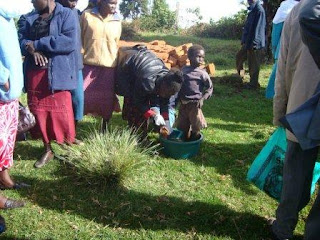David Komen (left) and Commissioner Joseph Kipsaina (right)
I visited the Keiyo County Council building and met with David Komen, who heads the Environment and Wildlife department. The department has a huge range of responsibilities, ranging from environmental management to public health.
Native forest just above Iten's water supply. Notice the cleared area and farm on right.
I asked David what considered the major environmental issue in the area. He replied that it was deforestation in water catchment areas. Growing population has pushed people to clear forest for farming. The forests are necessary to provide dependable clean water. Significant surface erosion can occur after clearing. The Keiyo County Council does not have a lot of power to prevent people from cutting the forest. But the council does try to encourage farmers to plant trees and operates a tree nursery. There is a permit system for gathering firewood, but there are problems with people cutting trees at night. Komen hopes to build community ownership in the forests.

A huge part of David’s job involves public health. A major project he is working on is jigger treatment. Jiggers are a parasitic flea. Females burrow into the flesh of a person (usually on the foot) and feed on the human. The jigger becomes engorged and can grow to pea sized. The jigger is extremely painful, and can cause secondary infections. Jiggers are a problem at the higher altitudes in very poor areas. People who have no shoes and live in mud huts with dirt floors are most susceptible.
Community Action Day in rural village (photo courtesy Keiyo County Council)
David organized a series of “Community Action Days” for treatment of people affected by jiggers. The goal is to hold an event where hundreds of people come to a town meeting. The jiggers can be killed by a 15 minute soak in a Lysol solution. Surgical equipment is necessary to manually remove jiggers as well. People need to be educated about prevention of future infection, which mostly means Cleaning supplies are provided for people to clean their dirt floors.
Children receiving treatment for jiggers (photo courtesy Keiyo County Council)
The visits serve many purposes. David also performs HIV education, distributes condoms, gives medication for intestinal infections, discusses sanitation, water quality and tuberculosis. David also organizes community health days in lower elevations that are not affected by jiggers. The focus is slightly different including malaria and distribution of mosquito nets for beds. Malaria is not present at higher elevations, and jiggers are not present at lower elevations.
Funding for these community health days comes from a variety of sources. David showed me an application to the regional government for funding. Condoms were provided by the Global Fund Program. Non-governmental organizations in Kenya and abroad also provide funding. One community health day costs about $2000. David has a wide range of responsibilities and limited funding. Looking after the environment and public health of an entire county is a huge job. But David's efforts result in real benefits to some of the poorest people in Kenya.
Person with severe jigger infestation receiving treatment. (photo courtesy Keiyo County Council)




Current studies have confirmed the efficiency of desiccated porcine thyroid supplements and are now prescribed as medication to treat hypothyroidism.
ReplyDelete